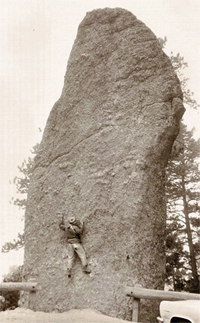Bouldering
File:Hueco Tanks - Baby Martini - V6.webm
File:Indoor Bouldering V3 Rock Spot.webm
Bouldering is a form of rock climbing that is performed on small rock formations or artificial rock walls, known as bouldering problems, without the use of ropes or harnesses. While it can be done without any equipment, most climbers use climbing shoes to help secure footholds, chalk to keep their hands dry, and bouldering mats to prevent injuries from falls. Bouldering problems are usually less than 6 meters (20 ft) tall.
History
The activity of bouldering as a separate discipline has its origins in the late 19th and early 20th centuries. Early practitioners of bouldering included the legendary British climber Oscar Eckenstein and the French alpinist Pierre Allain, the latter of whom invented the first specialized bouldering shoe in the 1930s. However, it was not until the 1950s and 1960s, with the development of crash pads and the popularization of the sport by climbers like John Gill, that bouldering began to emerge as a distinct form of climbing. Gill introduced gymnastic elements and emphasized the importance of strength and technique, which significantly influenced the development of bouldering.
Technique and Style
Bouldering techniques and styles vary widely, depending on the type of rock and the complexity of the problem. Climbers focus on body positioning, footwork, and hand placement to successfully complete a problem. Problems are typically graded using a bouldering grade system, which assesses the difficulty of the climbs. The most commonly used grading systems are the V-scale in the United States and the Fontainebleau scale in Europe.
Safety
Safety in bouldering is paramount, as falls are common. Bouldering mats, also known as crash pads, are used to cushion falls, and spotters are often employed to help direct the fall of the climber. Despite these precautions, injuries can occur, most commonly sprains or fractures from falls or overuse injuries from the intense physical activity.
Competitions
Bouldering competitions have gained popularity worldwide. These competitions are usually held indoors on artificial climbing walls. They involve climbers attempting to solve as many problems as possible within a given timeframe. The International Federation of Sport Climbing (IFSC) organizes world cup competitions and world championships in bouldering, along with lead climbing and speed climbing.
Culture
The bouldering community is known for its informal and inclusive culture. Many climbers spend time outdoors, working on problems together and sharing techniques. The sport's accessibility, requiring minimal equipment and featuring problems of varying difficulties, makes it appealing to a wide range of participants, from beginners to elite climbers.
Environmental Impact
Bouldering outdoors has an environmental impact, including soil erosion and vegetation damage around popular bouldering areas. Climbers and organizations are increasingly aware of these impacts and advocate for responsible climbing practices to minimize their footprint.
Transform your life with W8MD's budget GLP-1 injections from $125.
W8MD offers a medical weight loss program to lose weight in Philadelphia. Our physician-supervised medical weight loss provides:
- Most insurances accepted or discounted self-pay rates. We will obtain insurance prior authorizations if needed.
- Generic GLP1 weight loss injections from $125 for the starting dose.
- Also offer prescription weight loss medications including Phentermine, Qsymia, Diethylpropion, Contrave etc.
NYC weight loss doctor appointments
Start your NYC weight loss journey today at our NYC medical weight loss and Philadelphia medical weight loss clinics.
- Call 718-946-5500 to lose weight in NYC or for medical weight loss in Philadelphia 215-676-2334.
- Tags:NYC medical weight loss, Philadelphia lose weight Zepbound NYC, Budget GLP1 weight loss injections, Wegovy Philadelphia, Wegovy NYC, Philadelphia medical weight loss, Brookly weight loss and Wegovy NYC
|
WikiMD's Wellness Encyclopedia |
| Let Food Be Thy Medicine Medicine Thy Food - Hippocrates |
Medical Disclaimer: WikiMD is not a substitute for professional medical advice. The information on WikiMD is provided as an information resource only, may be incorrect, outdated or misleading, and is not to be used or relied on for any diagnostic or treatment purposes. Please consult your health care provider before making any healthcare decisions or for guidance about a specific medical condition. WikiMD expressly disclaims responsibility, and shall have no liability, for any damages, loss, injury, or liability whatsoever suffered as a result of your reliance on the information contained in this site. By visiting this site you agree to the foregoing terms and conditions, which may from time to time be changed or supplemented by WikiMD. If you do not agree to the foregoing terms and conditions, you should not enter or use this site. See full disclaimer.
Credits:Most images are courtesy of Wikimedia commons, and templates, categories Wikipedia, licensed under CC BY SA or similar.
Contributors: Prab R. Tumpati, MD



